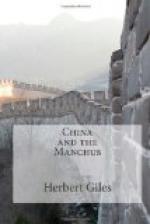to the crisis was a suggested issue of paper money
and debasement of the popular coinage. Among his
generals, however, there was now one, whose name is
still a household word all over the empire, and who
initiated the first checks which led to the ultimate
suppression of the rebellion. Tseng Kuo-fan had
been already employed in high offices, when, in 1853,
he was first ordered to take up arms against the T`ai-p`ings.
After some reverses, he entered upon a long course
of victories by which the rebels were driven from
most of their strongholds; and in 1859, he submitted
a plan for an advance on Nanking, which was approved
and ultimately carried out. Meanwhile, the plight
of the besieged rebels in Nanking had become so unbearable
that something had to be done. A sortie on a large
scale was accordingly organized, and so successful
was it that the T`ai-p`ings not only routed the besieging
army, but were able to regain large tracts of territory,
capturing at the same time huge stores of arms and
munitions of war. These victories were in reality
the death-blow to the rebel cause, for the brutal
cruelty then displayed to the people at large was
of such a character as to alienate completely the sympathy
of thousands who might otherwise have been glad to
see the end of the Manchus. Among other acts
of desolation, the large and beautiful city of Soochow
was burnt and looted, an outrage for which the T`ai-p`ings
were held responsible, and regarding which there is
a pathetic tale told by an eye-witness of the ruins;
in this instance, however, if indeed in no others,
the acts of vandalism in question were committed by
Imperialist soldiers.
It is with the T`ai-p`ing rebellion that we associate
likin, a tax which has for years past been
the bugbear of the foreign merchant in China.
The term means “thousandth-part money,”
that is, the thousandth part of a tael or Chinese
ounce of silver, say one cash; and it was originally
applied to a tax of one cash per tael on all
sales, said to have been voluntarily imposed on themselves
by the people, as a temporary measure, with a view
to make up the deficiency in the land-tax caused by
the rebellion. It was to be set apart for military
purposes only—hence its common name, “war-tax”;
but it soon drifted into the general body of taxation,
and became a serious impost on foreign trade.
We first hear of it in 1852, as collected by the Governor
of Shantung; to hear the last of it has long been
the dream of those who wish to see the expansion of
trade with China.
Tseng Kuo-fan was now (1860) appointed Imperial War
Commissioner as well as Viceroy of the Two Kiang (=
provinces of Kiangsi and Kiangsu + Anhui). He
had already been made a bataru, a kind of order
instituted by the first Manchu Emperor Shun Chih,
as a reward for military prowess; and had also received
the Yellow Riding Jacket from the Emperor Hsien Feng,
who drew off the jacket he was himself wearing at the
time, and placed it on the shoulders of the loyal
and successful general. In 1861 he succeeded
in recapturing An-ch`ing and other places; and with
this city as his headquarters, siege was forthwith
laid to Nanking.




